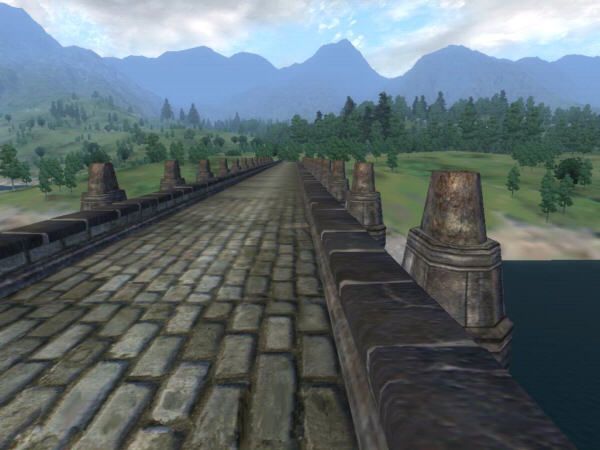Monday 19 February 2007

|
Pic of the day: Bridging the gap. (Screenshot from Oblivion.) The Core and the GapJust recently a theory came to my attention. Thomas P.M. Barnett, an American military expert, has written a couple books, the most relevant here being "The Pentagons's New Map", which you can buy from Amazon if you are very interested. I am considering it, but so far I have just read up online about his theories, including his blog. Basically he sees the world currently as consisting of two types of countries: The (Functioning) Core and the (Non-Integrating) Gap. The Core consists of those countries that accept globalization, pay the price and reap the benefits. Traditionally these used to be democracies, but today for instance China is part of the Core, at least the coastal provinces. Because trade unavoidably leads to some cultural exchange, dictators are wary of it, as are religious fundamentalists. The countries where these rule fall well outside the Core, and view it with great suspicion, even though they're losing money by their isolation. The theory is that the Gap, the countries that are outside globalization, are the true security risk. An integrated country is not interested in going to war, certainly not against another Core nation, because this would disrupt their economic growth. And generally the newly integrated states are the ones that experience the fastest growth, so nations like China or Russia have a strong benefit from keeping their finger off the trigger. In contrast, the Gap goes from bad to worse, and have little to lose. In fact, nothing like a good war to drum up support from the unhappy populace! ***This would explain why the USA is pointing their guns are dirt-poor third world countries rather than any realistic contenders to their world hegemony. Their rivals certainly have their schemes going on various different levels, but they would be mad to seek a direct, military confrontation. In contrast, the leaders of Iran and North Korea (like Iraq before them) are already mad. It is not just a question of economic integration, but of fundamental values. "The Russians love their children too" as the song goes, but their leaders in the past may have held less love for their populace. And the dictators of today's rogues nations are so far off our consensus reality that they might well literally think it better for their country to be ravaged by nuclear war than to fall under the sway of capitalism. I mean this in a very literal sense. During the Cold War, you probably know many who thought the exact same thing about your own country and its opponent. "Better dead than red" was not unheard of in the West. This is the same horror with which a fundamentalist Muslim might watch the aspect of his country becoming westernized. The majority of people probably don't think so, not really, not literally. But they don't have much say in the government either, so what they think is of little interest. You have to understand that these things are not random. Already in America there are many who are outraged by modern life, with gays wandering freely in the street and women dressed like harlots trying to become senators and maybe even president. Imagine a country where women have only their eyes visible, and that as little as possible, and the prospect of their holy places becoming a new San Fransisco. It is the end of the world as they know it, and they don't feel fine at all. Better to go down fighting. ***OK, I am adding my own thoughts here, but the concept of the Core and the Gap are central to his worldview, and it is not random which country is which. The obvious way toward global peace is to extend the Core, preferably by peaceful means. As a military expert he has a lot of theory on how to deal with conflict, of course. First send in the marines (or Leviathan, as he calls the strike force) and then send in the System Administrators to quickly rebuild the conquered land. This is where the USA failed in Iraq. The strike worked fine, but then the army was more or less useless in the next phase. Society fell to pieces, people were without food and electricity, discontent escalated to desperation. Elections are nice, but if the country is to join the Core, it needs so much more than a token democracy. Of course, the idea is not to systematically invade one country after another and westernize them. Rather this is the last resort when they represent a threat to the Core (which Iraq didn't, by the way). The preferred solution is to use the Seam states, the countries that lie between the Core and the Gap. Turkey is a great example. If these have a political and cultural atmosphere that sympathizes entirely with the Core, and are given help to maintain a high security, they will not serve as a conduit for terrorists, but will serve as an examples of the benefits their neighbors may experience if they accept democracy, rule of law and freedom of speech. You may want to make up your own mind about all this. To me it is interesting mainly because it introduces useful tools for the thought, concepts that make it easier to talk about global politics in the 21st century. Things are not the same any longer, and the concepts we use should reflect this. |
Yesterday <-- This month --> Tomorrow?